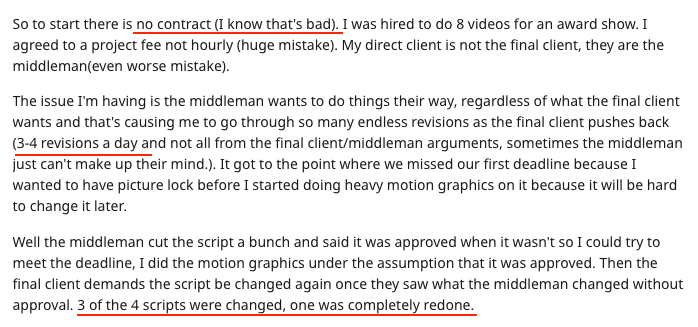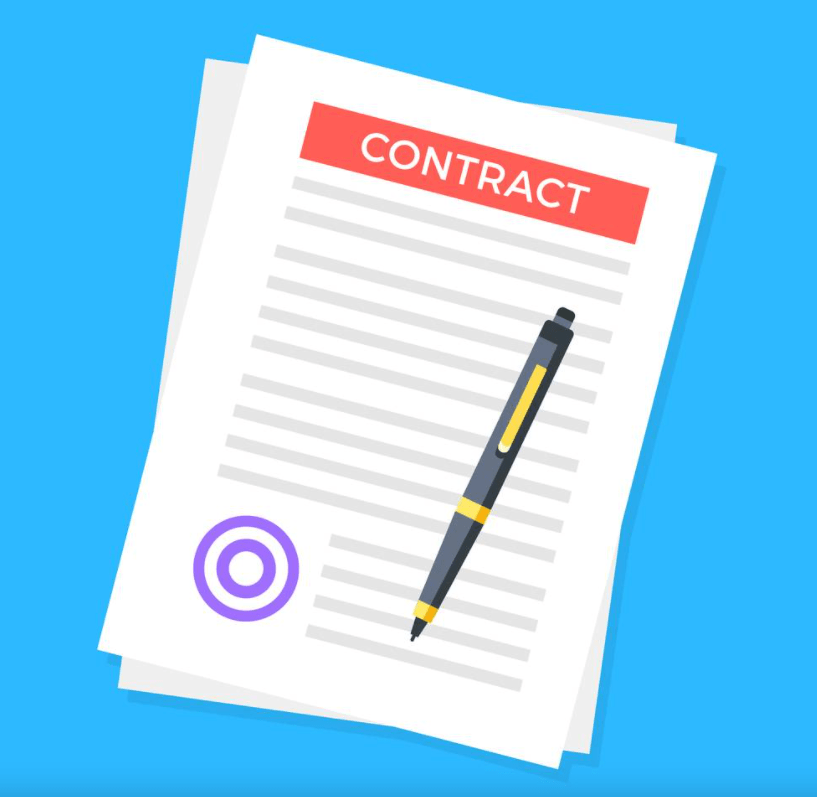As a freelance video editor, you have to deal with lots of things around your freelance business and even go outside your work as an editor or post production assistant.
After all, you’re a business owner. That means handling financials, marketing, client & project management and even legal stuff.
Speaking of legal stuff, do you need to have a contract as a freelance video editor?
The short answer is YES!
While many freelancers never bother with written agreements, a contract can be lifesaving in many situations. It provides a clear framework for the work you’re going to be doing and it sets the boundaries for some unpleasant events.
Like a client refusing to pay or demanding more work for free.

If you’ve never signed a contract with a client before starting a project in the past, the time has come to make a change.
Here are five of the biggest reasons why every single freelance video editor needs to have a contract drafted and signed.
These are of course only for professional work and not for helping a friend or working with a small client / project.
Those kinds of projects can work just fine without a contract.
1. Always have a Good Idea about Project Scope & Deliverables
Anyone who has done freelance work for a bit of time knows that clients often try to get a bit of work for free.
Freelancers who are just counting on a ‘‘handshake agreement’’ may end up doing lots of revisions and extra work, if those clients misunderstand or just straight up exploit the agreement. The reason for those kinds of hurdles is easy to understand – there is no clear definition of the project scope or style.

One of the main things that a video editing contract does is define the scope of the project.
A customized agreement will feature information on the specific type of work that needs to be done, the number of free revisions included in the package (and the conditions under which the video editor will handle such additional requests), the deliverables a client will receive and even the timeframe for project completion.
When all of these important aspects of any project are described in writing, both parties are on the same page (literally!) about the specifics of the work and contract.
Having clarity right off the bat will keep you from having to do a lot of extra work for free. The contract will also set reasonable client expectations. As a result, nobody is going to be disappointed with the outcome or the services being provided.
Important: To get the most out of your contracts, you need to draft a personalized agreement for each project or package you’re working on.
A generic contract isn’t going to feature enough information about the scope of that particular project, which means you wouldn’t benefit a lot in the form of protection if there’s a dispute or an additional work request.
For example, if you have created a contract for a low budget music video you can’t really use that exact contract for a high end production or music video.
If you do that you’re either selling yourself short or setting the wrong expectations for the client and the project.
2. Clear Definition of Fees and Milestones

This one is obviously a no-brainer but the reason is so important that it has to be discussed in some detail.
Will you charge an hourly or a fixed fee?
Does the client have to pay a percentage of the total amount upfront?
How do you expect to be paid when the project is done?
How will you charge for extra work?
Will the clients receive the source files and are they entitled to anything for free?
These are all important questions to answer in a written agreement before you start working.
Some clients will try to renegotiate the terms and conditions halfway through the project and it’s crucial you highlight what you think about that and similar stuff. Most freelancers have been through similar situations as not everybody starts with a contract and it’s very uncomfortable.
When a contract is precise about the specific payments and fees, there’s a big chance you’ll cut a lot of tiring and frustrating back and forth out.
Important: If you’re charging by the hour, you may want to feature a minimum and maximum working hours clause. That one gives the client a range of working hours that may be needed to get the job done, preventing discounts or disappointments at the end of the project.
Also, always include a clause about late payments and fees.
3. Kill Clauses and Other Important Terms
Creating a video editing contract allows you to include extra conditions to protect yourself from potentially sticky situations during the process of working on the project.
There are a couple of great clauses you may want to use for the purpose:
- A kill clause: what situations give you the right to end the contract without losing payment for the work already done?
That’s precisely what a kill clause defines. It’s important to have for the rare instances in which a relationship with a client may get complicated. - Usage rights and copyright: do you have the right to feature the work you’ve done for a client in your portfolio? Are you going to be credited for all of the post-production efforts?
These aspects of freelance work are very important because they’ll give you a chance to show the work you’ve done and use it for future marketing. - Independent contractor clause: an agreement should state clearly that you’re doing work as an independent contractor.
This clause protects your status as a freelance video editor and will keep you from getting into some sticky taxation issues later on. - Non-disclosure: while such a clause is rarely needed in the realm of video editing work, it can be beneficial. Non-disclosure agreements prevent both parties from revealing confidential information to entities outside of the working relationship.
If you have a professional process you want to protect, a non-disclosure clause in the contract would be the way to go. These are especially important for big studio editors.
These are somewhat common clauses featured in most contracts to ensure protection in a wide range of situations.
If you’re doing niche work or you have some worries about a potential interaction with a client, consulting a legal professional about the creation of more personalized clauses would be a good idea.
4. A Chance to Pinpoint Serious Clients
How do you determine if a client is serious enough and deserving of your professional effort?
The answer is simple – get them to sign a contract.
Most clients that are serious about getting work done wouldn’t mind defining the scope of the projects legally.
On the other hand, potential “clients” who intend to twist your arms and cause issues aren’t that likely to put their signature at the bottom of a binding document.
Having a contract is one of the best ways to sort through potential clients and do work solely for the ones deserving of it.
Many freelancers waste a lot of time and effort on clients who aren’t appreciative, who aren’t willing to pay exactly what the job is worth or who are nothing more than scammers looking for a bit of free work and someone to exploit.
If you’ve been burnt in the past (and chances are that you have been!) and you want to reduce the risk of having to handle the client from hell ever again, you should definitely start pushing for contract signing first.
Important: Again, small one-time projects won’t need a big contract. For those kinds of projects a few lines about the scope and terms is fine.
5. To Demonstrate Your Professionalism

Here’s one final, very important benefit of having a freelance contract with your client.
Companies that offer services would never start on a project before a contract is signed. Agreeing on the legal terms of the business partnership is pretty much the norm and clients have gotten to expect that step.
Why should freelance services be any different?
Giving your client a detailed and customized contract shows that you’re serious about the work that you do and you’re a professional.
This may be a psychological effect but it’s going to work in your favor (especially when clients are serious and interested in a solid, long-term professional relationship).
In a sense, a legal agreement acts as a marketing tool. It shows you’ve put enough time and effort into considering the scope and specifics of the project. As a result, such a document is going to give many potential clients peace of mind.
Final Thoughts
Being a freelance video editor can be challenging. You’ll face many issues that people who are employed and working for someone else would never need to deal with.
Preparing and signing legal documents with clients is one of the best strategies you can use to help yourself. A contract gives you clarity and it protects you (and your client) from unforeseen circumstances.
Drafting such a document for the very first time can be daunting but it’s definitely worth the effort. You can even pay for a legal consultation the first time around – spending some money on lawyer fees will help you get the best possible and most comprehensive agreement.
Once you get that “template,” you can tweak and modify it to accommodate other projects. In time, you’ll have enough knowledge and experience to add and remove contract clauses depending on what the project entails.
Don’t be afraid to seek out such opportunities and suggest them to clients.
Are you looking for more information on creating a stable freelance video editing career?
You can receive more professional tips and suggestions by signing up to our mailing list now here.








Comments 1
Pingback: How to Handle Additional Revision Requests as a Freelancer - Taspin.com